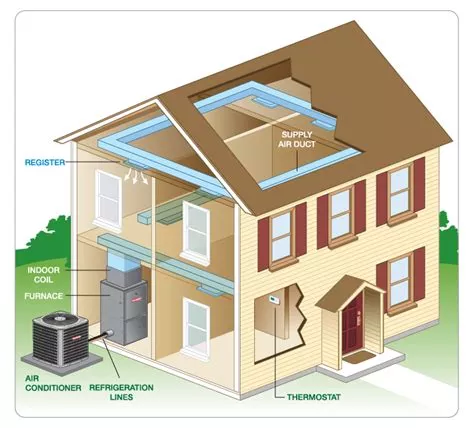Smart Service in the Queen City: Why HVAC Business Software Is Elevating Charlotte Homes
By Alan WattsIn Charlotte, reliable heating and cooling isn’t a luxury, it’s a necessity. With muggy summers, occasional heatwaves, and chilly winter mornings, HVAC systems are what keep homes livable and comfortable throughout the year. But as demand for quick, reliable service grows, many contractors are finding that traditional methods of managing schedules, invoices, and customer calls simply can’t keep up.
That’s why more local providers are embracing hvac business software. By centralizing day-to-day operations into one platform, contractors can work smarter, respond faster, and deliver a polished customer experience that matches the expectations of today’s tech-savvy Charlotte homeowners.
Charlotte’s Climate Challenge
The Queen City’s weather patterns present a unique challenge for HVAC service companies. In July and August, the combination of high humidity and 90+ degree temperatures pushes cooling systems to the limit. For homeowners, a broken air conditioner isn’t just an inconvenience, it’s a health concern.
Then comes winter, when sudden cold snaps mean heating systems must spring into action. These swings create spikes in service requests, often overwhelming smaller HVAC businesses that rely on manual scheduling and paper-based systems.
Without the right tools, contractors may double-book technicians, miss calls, or leave families waiting in uncomfortable conditions. Software helps smooth out these rough edges, ensuring customers aren’t left stranded when they need help most.
How HVAC Business Software Modernizes Home Services
At its core, HVAC business software is about turning chaos into order. Instead of juggling phone calls, sticky notes, and spreadsheets, contractors can manage everything from a single digital hub.
Streamlined scheduling keeps appointments organized and prevents double bookings.
Route optimization ensures technicians aren’t wasting time driving back and forth across Charlotte’s sprawling neighborhoods.
Digital invoicing and payments allow customers to settle bills on the spot, no more chasing payments weeks later.
Service history tracking gives homeowners peace of mind, showing exactly what was done and when.
For busy families, this means faster service and clearer communication. For contractors, it means fewer mistakes and a system that scales as their business grows.
A Better Experience for Homeowners
Charlotte homeowners are used to digital convenience in nearly every part of their lives, whether it’s ordering groceries online, scheduling an Uber, or paying bills from their phones. They now expect the same level of ease when dealing with service providers.
With HVAC business software, companies can deliver:
Appointment reminders sent directly to a homeowner’s phone.
Real-time technician tracking so families know exactly when help will arrive.
Electronic receipts issued instantly after service is complete.
Instead of uncertainty, homeowners get clarity and control. That experience builds trust, loyalty, and referrals. In a competitive market like Charlotte, where many HVAC providers vie for attention, the businesses that create smooth customer journeys are the ones that stand out.
Supporting Charlotte’s Small Contractors
While Charlotte has its share of large service providers, many HVAC businesses here are still small, family-owned operations. These companies often rely on word-of-mouth and personal relationships to grow. But as the city expands and customer expectations rise, competing without digital tools becomes harder.
HVAC business software levels the playing field. It allows small contractors to:
Run lean operations with fewer back-office staff.
Scale up without drowning in paperwork.
Offer modern, tech-enabled service experiences comparable to larger competitors.
For these businesses, adopting software isn’t about losing their personal touch, it’s about protecting it. By reducing administrative headaches, they can spend more time focusing on their customers and less time chasing paperwork.
The Sustainability Connection
Charlotte has been steadily moving toward greener, more sustainable development. From LEED-certified office towers to energy-efficient new housing, sustainability is becoming a defining feature of the city’s growth. HVAC businesses have an important role to play in this movement, and digital tools can help.
By optimizing technician routes, companies cut down on unnecessary driving, lowering fuel consumption and emissions. Digital scheduling and invoicing reduce paper usage. Perhaps most importantly, proactive maintenance reminders help extend the life of HVAC equipment, preventing premature disposal and reducing landfill waste.
The ENERGY STAR program, backed by the U.S. Environmental Protection Agency and Department of Energy, highlights that keeping HVAC systems properly maintained is one of the most effective ways to improve energy efficiency and reduce waste. In Charlotte, this aligns HVAC contractors with broader community values around sustainability and responsible growth.
Common Problems with Adoption
Despite the advantages, some Charlotte contractors remain hesitant to adopt HVAC business software. Common reasons include:
Cost concerns: Smaller businesses may view software as an added expense.
Employee resistance: Long-time staff may be reluctant to abandon familiar systems.
Training needs: Without proper onboarding, new tools can feel overwhelming.
But these hurdles are temporary. Once businesses experience the benefits, fewer missed appointments, faster payments, happier customers, the software quickly pays for itself. Early adopters gain an advantage in a city where the housing market and population continue to grow rapidly.
Looking Ahead: Smart Homes Meet Smart Service
Charlotte is also seeing a rise in smart home adoption, with more residents installing connected thermostats, energy-efficient systems, and app-controlled devices. As these homes become more intelligent, they’ll require smarter service providers who can integrate maintenance with technology.
The future of HVAC service in the Queen City will likely include:
Predictive maintenance, where systems send alerts before a breakdown occurs.
AI-driven scheduling that anticipates demand during extreme weather.
Integration with smart home platforms for seamless service.
HVAC business software will be the bridge connecting homeowners’ expectations for convenience with contractors’ ability to deliver reliable, proactive support.
Charlotte’s growth and climate challenges mean HVAC services will always be in high demand. But in today’s world, technical skill alone isn’t enough, homeowners want speed, transparency, and modern convenience. By adopting tools like HVAC business software, contractors can meet these expectations while improving their own efficiency and sustainability.
For the city’s small businesses, it’s a chance to thrive in an increasingly competitive environment. For homeowners, it’s the comfort of knowing their service provider is as modern and reliable as the systems they maintain.
For an inside look at how Charlotte companies are embracing emerging tech to stay competitive, see CLTCLT’s article “The Future of AI: Key Predictions by Peter Diamandis,” which explores how artificial intelligence is reshaping local business practices and strategic decision-making.









